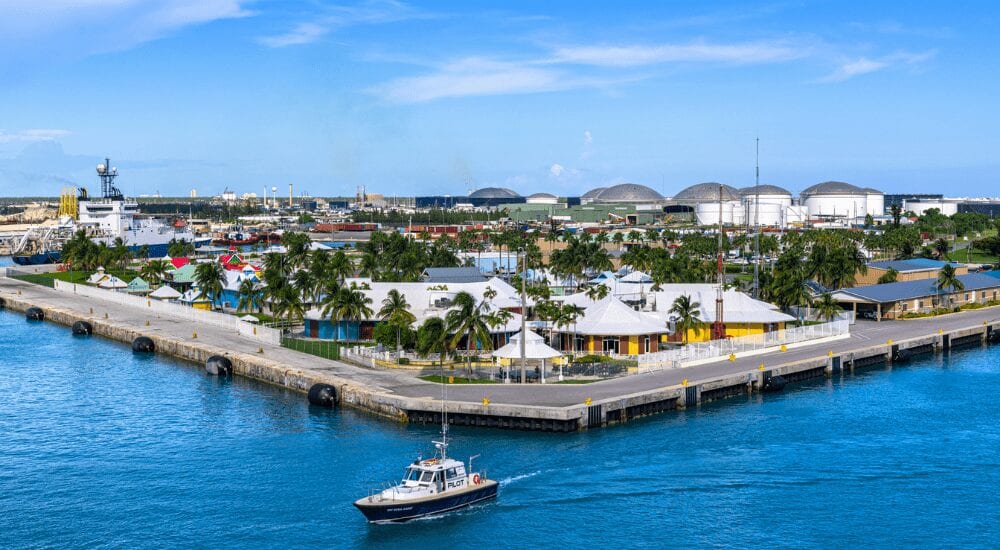
While a niche player, The Bahamas offers significant advantages in the right scenarios. Recent hurricane headlines don’t tell the complete story. The Bahamas is a resilient, high income country with first-world infrastructure, a dollar economy, and political stability.
As important as any other factor, The Bahamas, a sovereign country, is 20 minutes from metropolitan Miami and Fort Lauderdale.
Almost all of us have seen the devastation caused by Hurricane Dorian in August 2019. Hurricane Dorian was the worst hurricane in the recorded history of The Bahamas. As of this writing, the official death toll is 60: 51 in rural Abaco, 9 in more developed Grand Bahama, with 600 people still missing. Property damage is estimated at $7 billion USD.
[emaillocker id=26087]However, television news often (usually) neglects to cover the recovery and resilience. All modern construction in The Bahamas built in recent years is built to building codes to withstand hurricanes. Airports reopened immediately, and emergency management measures went into effect even before the storm arrived. The government was able to provide drinking water, utilities were restored, and businesses were able to reopen.
It is also important to point out that The Bahamas is an archipelago of over 700 islands. The hurricane only directly affected two major islands: Grand Bahama and Abaco. Businesses, hotels and infrastructure in distant islands, and in the capital of Nassau were not damaged.
The Bahamas’ close geographic, societal and political proximity with the United States was also a major mitigating factor. Many Bahamians were able to seek refuge in the US before and after the storm. The US government immediately deployed emergency aid in cooperation with Bahamian authorities. With only 50 miles between the two countries at the closest point, they already enjoy a close working relationship.
Hurricane Dorian is tied for the strongest Atlantic hurricane to make landfall in history (tied with the 1935 Labor Day Hurricane) and even still, most of The Bahamas was able to open for business the very next day.
The Bahamas was, is, and will be open for business.
 Executive Summary
Executive Summary
The Bahamas is an island archipelago country that lies between the US state of Florida on the west, Cuba to the southwest, and the Sargasso Sea of the Atlantic Ocean to the east. The Bahamas is made up of over 700 islands, has a subtropical climate, and a population of just under 400,000, mostly concentrated in the capital of Nassau, on New Providence Island, and Freeport, on the island of Grand Bahama.
The Bahamas gained independence from Great Britain in 1973 and remains a commonwealth nation. With a per-capita GDP exceeding $32,000 US dollars, The Bahamas is the third wealthiest country per-capita in The Americas, behind only The United States and Canada. Bahamians generally can visit the United States, only 20 minutes away by air (from the closest islands), or accessible by small boat, without visitor visas.
A long-standing banking center, The Bahamian dollar is pegged 1:1 to the US dollar, which is accepted as currency along with the US dollar in commercial establishments. The Bahamas has a very mature financial sector and is considered a major money center, with a stable judiciary based on British Common Law.
The Bahamas is a popular retirement or vacation home site for many US and British citizens because it is relatively safe, free from social and political unrest, and close: Several islands of The Bahamas have frequent direct daily flights to Miami International Airport, Fort Lauderdale International Airport, and Palm Beach International Airport, those flights lasting less than 30 minutes, and the major airports of Freeport and Nassau have international flights to major US cities, Europe, Latin America, and other Caribbean destinations such as Jamaica. Some Bahamian islands are close enough to Florida to be transited by small boats, and a few brave souls cross between The Bahamas and Florida on jet-skis.
The Bahamian Economy
Predictably, The Bahamas is a major tourism destination, especially for visitors from The United States and Canada. Tourism contributes slightly over 50% of the economy, followed by financial services, at 17%. The Bahamas, as an offshore financial center, is a popular domicile for asset protection trusts, as Bahamian courts do not recognize torts not committed in The Bahamas. It is also an ideal tax domicile for corporations & trusts.
The Bahamas has a growing industrial sector, and the country punches above its weight when considering the entire population doesn’t equate to a small city. The country produces and exports certain varieties of Bacardí rum, Guinness, and Heineken beer, as well as its own Kalik brand. Campari liqueur is made with cascarilla bark harvested from The Bahamas.
Though Nassau is the capital, situated on the island of New Providence, several islands are larger such as Freeport on the island of Grand Bahama. Grand Bahama is an industrial base, anchored by the Grand Bahama Port Authority, an entity created by the 1955 landmark Hawksbill Creek Agreement. This created a free trade zone encompassing the majority of Grand Bahama Island, adding additional benefits on top of The Bahamas’ already attractive tax regime.
- Zero income tax
- Zero corporate tax
- Zero capital gains tax
- Zero wealth tax
- 5.9% Employer-paid payroll tax
Freeport, Grand Bahama is a city-managed and operated by the Grand Bahama Port Authority (GBPA). Hong Kong-based Hutchison Whampoa operates a container port in Freeport that is a joint venture with the GBPA.
- Freeport is also home to the Grand Bahama Shipyard, able to service very large cruise and commercial ships of up to 82,500 tons displacement.
- Freeport is home to the Bahamas hub of Buckeye Global Marine Terminals. Buckeye Bahamas hub is the largest petroleum products terminal in the Western Hemisphere with 8 berths and over 26 million barrels of storage capacity for gasoline, diesel, fuel oil, crude oil, and heavy distillates (VGO).
There is a small agriculture and fisheries industry in The Bahamas. The Out Islands are all the habited Bahamian islands except for New Providence and Grand Bahama. Some are popular with private pilots and provide small-scale tourism and accommodations. Guided and chartered sport fishing and diving are important economic activities.
In 1918 at the age of 16, the author’s grandfather emigrated to the United States from Crooked Island, Bahamas, an island of almost 90 square miles, but with less than 400 people. The island has two airstrips frequented by private pilots, several small bed & breakfasts, and charter fishing operations. The two Gibson’s Cafeterias are still in his family.
One growing economic sector in The Bahamas is specialty BPO / Professional Services. Kingston, Jamaica-based itelBPO operates a BPO contact center facility in Freeport (below photo) servicing clients in the energy, financial and tourism sectors.
Read the full report here.[/emaillocker]
About the Author:
 With over 20 years of experience, Loren Moss combines hands-on executive and leadership experience with the insight & analytical skills of a journalist and researcher.
With over 20 years of experience, Loren Moss combines hands-on executive and leadership experience with the insight & analytical skills of a journalist and researcher.
Fluent in English & Spanish, Loren Moss is a published author with several books and over a thousand papers and articles published in business & technology media.
Loren Moss is trusted by a blue chip roster of enterprise and government clients.








